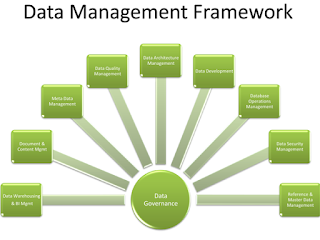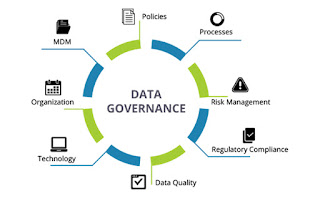Does Professional MDM Providers Really Think About Data Governance?
With the professional
mdm providers coming across varying definitions of data governance, it is really
important that you and your company stay on the same page.
Since we have come halfway
through 2018, it seems that every mdm solutions provider is speaking and
thinking about data governance and its importance, but there are many mdm
solutions providers that feel like they have missed some vital introduction.
But the reality is, formalized
data governance is actually in its early years, and mdm solutions agencies came
across the fact that individuals that do not understand data governance
comprise the majority. Industries, business sizes and job function enlightens
and controls how we describe data governance and what it actually means to mdm
providers.
But it is not important to come
up with a universal and proper definition, instead to understand the essentials
of what data governance actually involves, what it is planned to achieve and in
what ways it can give out extremely important functions in an age of big data.
So, let us just quickly dig into data
governance and try to comprehend what everyone seems to be thinking and speaking
about.
A Fleeting Glance at the
Master Data Fruition:
Let us just avoid digging in deep
inside the extensive history of data, but develop a basic understanding of data
governance, which presently asks for a historic context of how master data has really
grown with time. Initially, data was mainly
a transactional apprehension, the use or generation of data was process-based
and data was generated through business processing activities and restricted to
a choose few.
But as the time passed, the understanding
slowly dawned amongst the mdm providers that
master data had true potential beyond the dominion of IT and data processing. Business
enterprises started considering the right approaches to elevate their data from
byproduct to business asset with the help of data analysis for decision-making.
Since then, the use cases for Business
Intelligence (BI) have evolved exponentially and the technological developments
have allowed increasingly difficult mining of data for generating better business
insights. Gone are the days, when just the
largest mdm companies having the deepest pockets can reap the 100% benefits of
BI and data analytics.
Master data no longer relates just
to big business, since different businesses of all sizes and niches can easily collect
data speedily. Still the value of data slouches not in volume, rather in a
company’s ability to speedily leverage that data for business advantage. In an
increasingly intricate regulatory landscape, the compliance hazards could be sharp
if data and processes have not been managed correctly.
Know How Data
Governance Emerged:
Nowadays, data has turned out to
be an important asset and the demand for extract value from those assets has
moved from a business advantage to a competitive imperative. Its broad array of
use cases now requires business professionals to find and manipulate data to
quickly perform analytics to solve business problems. But to realize data’s
full potential, it must be managed like any other asset before it turns into a
liability.
MDM
solutions providers must be acquainted with where it actually came from,
how old it is, what is the quality of it, where to actually find it and how to make
use of it correctly. Take for instance a third party or licensed data set. How will
you get to know whether you are authorized to employ it in your data analysis
or not? How can you trust it? You will not do it unless the data governance terms
and data owners evidently affirm the scope of its use and metrics to comprehend
its data quality.
The answers to these questions will
establish the foundation of data governance in business. It asks for a
repository of these answers and the people and systems which rule data across a
business enterprise. It is basically the formal orchestration of individuals,
processes and technology which allows a company to leverage data like a
business enterprise asset. This appears to be easy, but managing data
governance on a spreadsheet or in a mdm platform can only get you so far.
Understanding the Primary
Building Blocks of Data Governance:
Considering the organizational
role, anyone’s outlook about data governance could be slightly tapered. A
compliance professional will reasonably look data governance by the lens of prospective
regulatory breaches. Data should be appropriately catalogued, scored and
defined so that all the users across a business enterprise can view the available
assets, know what they are and how to make use of them and have a dependable indicator
to measure the competence of that data for generating the best quality business
decisions.
A data governance program must
start with its fundamentals like data lineage, data dictionary and a business
glossary. Data lineage is extremely important for the IT professionals, but its
data burden for business professionals who require it to be decoded into a
business lineage which is a primary skill of data governance.
Beyond these key elements, data
governance should also characterize terms, ownership and data quality across a
business enterprise. But how can you implement an effective data governance
strategy?
How to Execute an
Effective Data Governance Strategy?
Evidently, there are several
moving elements to building a flourishing data governance framework, but through
building a solution step-by-step maximizes the significance of data assets and generates
a winning synergy of individuals, procedure and technology.
The most excellent data
governance strategy maximizes the value of the analytic insights and also
ensures the enduring quality of the master data with machine learning, improved
efficiency and asset exploitation by understanding and precision and amplified
collaboration across your company through evidently defined duties and
workflows.
Data governance is reliant on a
supporting the framework of systems and procedures, but it is uniformly dependent
on the data owners, data stewards and the business users that transform that
data into value.
So, commence asking yourself few simple
questions such as, Can a wide set of users give similar answers to what is the description
of the data on this report? Or who exactly is the data owner and what is data
quality? Usually, these answers vary considering on whom you actually ask and why
an individual’s data governance is not operating accurately.
So, for professional mdm
providers to start and implement an effective data governance strategy you
need to identify with the data governance fundamentals discussed above and
employ them right away!








Comments
Post a Comment